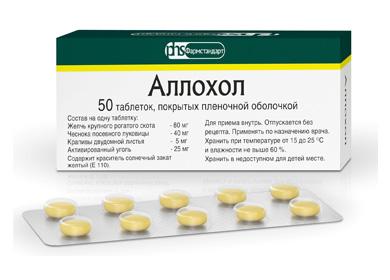The content of the article
Drug treatment of diseases of the liver and gall bladder in most cases requires an integrated approach. In the scheme of their therapy quite often include agents that improve the secretion of bile (choleretic). The latter, in turn, may have a twofold effect. The first group of drugs promotes the formation of bile by the liver cells, the second improves its evacuation from the biliary tract to the intestine.
Features of the drug
"Allohol" refers to those pharmacological agents that not only increase the production of bile, but also improve its progress along the bile ducts. This drug was launched on the pharmaceutical market more than 50 years ago. Over many years of use, its properties have been well studied and proven safe for the body.
"Allohol" has a multidirectional therapeutic effect:
- helps to improve digestive processes in the duodenum;
- reduces the symptoms of biliary dyskinesia;
- improves gallbladder activity;
- accelerates the absorption of lipids;
- normalizes intestinal microflora;
- improves the overall health of the patient.
Composition
The composition of "Allohol" includes only natural ingredients. All of them are carefully selected in such proportions as to provide the maximum therapeutic effect. The drug includes the following ingredients:
- Activated carbon;
- bile;
- garlic extract;
- extract from nettle leaves.
Bile, which is part of the preparation, is a necessary component of digestion, in particular, the process of digestion of fats.
Operating principle
Bile acids provide emulsification of lipids, and thus contribute to their maximum interaction with pancreatic lipases. It is bile that activates the absorption of fat-soluble vitamins, stimulates intestinal motility.
Garlic has long been known in both folk and traditional medicine for its medicinal properties. The substance allicin, which is part of it, promotes emulsification of fats, is a good antiseptic, and suppresses putrefactive processes in the intestinal lumen. This positively affects the processes of fermentation and assimilation of nutrients, improves the absorption of fatty acids. Also in clinical studies, the role of garlic in the normalization of serum cholesterol has been proven.
An equally important component of Allohol is an extract obtained from nettle leaves. The therapeutic effect in this case is provided by those entering the nettle:
- vitamins (K, B, C, carotene);
- phytoflavonoids;
- tannins;
- macro- and microelements.
Therefore, nettle promotes bile secretion, reduces dyspeptic symptoms, improves the absorption of nutrients in the intestines.
Indications
"Allohol" is used for various diseases of the hepatobiliary system and pathologies of the gastrointestinal tract. The reasons for the appointment are:
- violation of the excretion of bile in the biliary tract;
- chronic liver disease with insufficient bile formation;
- impaired absorption of fats in the intestine;
- inflammatory diseases of the biliary tract.
This drug is used for biliary dyskinesia, fatty hepatosis, cholangitis and cholecystitis. "Allohol" helps to eliminate bitterness in the mouth. Due to the normalization of the gastrointestinal tract (GIT), it reduces heartburn, nausea. Also useful for patients undergoing rehabilitation after gallbladder removal. Since the drug has a good choleretic effect, it is often recommended in complex treatment and for the prevention of constipation.
Application
Usually, Allohol tablets are taken after meals. Swallow the medicine whole and drink plenty of water. Drink one or two tablets at regular intervals three to four times a day.
During an exacerbation of the disease, the dosage of the drug is one tablet, which is taken two to three times a day. In the presence of constipation, take one tablet three to four times a day immediately after each meal. To clean the liver, take one or two tablets four times a day. Duration of admission is one to two months.
In some sources, you can also find recommendations on the use of "Allohol" for weight loss. However, in the official instructions for the drug on this occasion there are no indications. In addition, this medicine promotes the absorption of fats, so it is unlikely to contribute to weight loss.
Side effects and contraindications
The drug is well tolerated by patients. Of the side effects, diarrhea may occur due to increased bile secretion. Allergic reactions to the herbal components of this pharmaceutical product are also possible.
In case of an overdose, the following are possible:
- diarrhea;
- vomiting and nausea;
- heartburn;
- increased levels of liver enzymes.
Contraindications for use are:
- peptic ulcer of the stomach or duodenum;
- erosive gastritis;
- acute hepatitis with impaired liver function;
- cholecystitis;
- gallstones
- pancreatic disease (pancreatitis).
"Allohol" is well compatible with drugs. However, it is not recommended to use it simultaneously with other choleretic drugs.

Acquisition and analogues
"Allohol" is sold in pharmacy chains without a doctor's prescription. It is classified as an inexpensive drug. One package (50 tablets) costs 60-90 rubles (data for June 2018).
In pharmacies, you can find only one analogue of the original drug - "Allohol-UBF." However, on sale there is a sufficient number of drugs with choleretic properties:
- "Cholenzym";
- "Carsil";
- "Holosas";
- Hofitol;
- Tsinariks.
Allochol is an effective and inexpensive drug with proven safety. It has a good choleretic effect, improves digestion and promotes better absorption of fats.Despite the herbal composition, the medicine is contraindicated in some diseases of the liver and other organs of the gastrointestinal tract, so the question of its use should be agreed with the attending physician.

